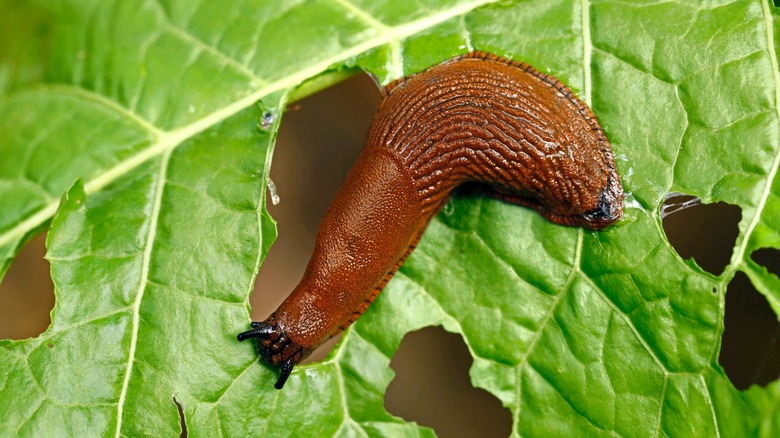Don't Throw Out That Leftover Beer — Use It In Your Garden Instead
Few things in life are as disappointing as stale, tasteless beer. From swill like Kirkland Signature Light Beer, the discontinued Costco alcohol that disappeared due to tragi-bad reviews, to your run-of-the-mill summer brew that's been sitting in a pitcher in the sun for too long, not all beer ends up being imbibed. Yet, even for truly unpalatable brewski, there's no need to swirl it down the drain. Instead, use it in your garden for a number of helpful remedies, chief among which is killing pests.
While coffee grounds have limited use in your kitchen when it comes to repelling ants, using beer to trap and eliminate pesky slugs and snails is not just a myth. Pests are attracted to the yeasty odors given off by the fermentation products in beer. When you make a trap by pouring a small amount of useless beer into a shallow dish, the insects will fly, squiggle, or glide into the liquid and suffer a boozy death by drowning.
While certain creepy-crawlies are more partial to beer than others, you can catch all sorts of pests that might otherwise dine on your garden plants, like beetles and fruit flies as well. As a bonus, mosquitoes, which are driven by their keen sense of smell, may become confused by the scent of the beer and fly away from your garden ... and who doesn't love driving away mosquitoes? For the best results, place several traps in your garden and check them frequently.
Other uses for beer in your garden
While leftover beer shines as a pesticide, that's not its only use in your garden. Like your leftover potato water, which you can repurpose as fertilizer, your hungry plant babies may also love slurping up a (flat, stale) cold one when they are growing. Your average beer contains generous amounts of nutrients that plants need, including the "big three" of nitrogen, phosphorus, and potassium. All you need to do is dilute your beer in water and sprinkle it generously on your fruits, veggies, and flowers. Beer can also work a treat in revitalizing your lawn when sprayed on sections that need some oomph.
If your plants are showing signs of fungal infections, diluted beer is also your answer. When you see warning signs of fungus, like powdery mold or black spots on the leaves of your plants, dip a paper towel in your beer solution and rub it gently on the affected areas. In cases where the infection isn't too severe, repeating this application every few days for a couple of weeks should do the trick.
Nurturing a backyard compost heap? Beer will also help here. The yeast in leftover beer can do much to turbo-charge the growth of good bacteria in your compost, making it ready for garden use faster. Additionally, beer adds moisture to your pile, which is often a good thing when it comes to compost — just don't soak the pile too much.

